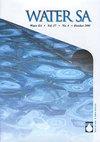公众对水再利用的看法:在南非马姆斯伯里建立对替代水源的信任
IF 1.2
4区 环境科学与生态学
Q4 WATER RESOURCES
引用次数: 0
摘要
最近发生在南非西开普省的干旱是自1904年以来最严重的一次。干旱严重影响了西开普省许多地区的散装水供应,特别是开普敦地铁和周边地区。为了缓解水资源短缺,废水回收(水再利用)已被确定具有增加该省供水的潜力。本文认为,尽管水循环有可能有助于缓解水资源短缺,但研究表明,公众的看法极大地影响了任何水循环方案的结果。该研究通过面对面访谈、焦点小组讨论和将故事应用于Gap参与性练习来收集数据。其中一个重要发现是,居民必须信任市政当局的能力和系统,这可以通过市政当局和居民之间有意义的参与来实现。我们认为,从富裕地区开始推出水再利用计划,可以增加低收入社区接受该计划的可能性。本文章由计算机程序翻译,如有差异,请以英文原文为准。
Public perception of water re-use: building trust in alternative water sources in Malmesbury, South Africa
The recent drought in the Western Cape Province in South Africa has been marked as the worst since 1904. The drought impacted severely on the availability of bulk water supply in many parts of the Western Cape Province, particularly the Cape Town Metro and surrounding districts. In order to alleviate water scarcity, wastewater recycling (water reuse) has been identified to have the potential to augment water supplies in the province. This paper argues that although water recycling has the potential to contribute towards alleviating water scarcity, studies have shown that public perceptions greatly influence the outcome of any water recycling scheme. The study collected data using face-to-face interviews, focus group discussions, and the application of the Story with a Gap participatory exercise. One of the key findings is that residents have to trust the municipal competencies and systems, and this can be achieved through meaningful engagement between the municipality and residents. We argue that rolling out a water reuse scheme by starting with affluent areas increases the likelihood of acceptance among low-income communities.
求助全文
通过发布文献求助,成功后即可免费获取论文全文。
去求助
来源期刊

Water SA
环境科学-水资源
CiteScore
2.80
自引率
6.70%
发文量
46
审稿时长
18-36 weeks
期刊介绍:
WaterSA publishes refereed, original work in all branches of water science, technology and engineering. This includes water resources development; the hydrological cycle; surface hydrology; geohydrology and hydrometeorology; limnology; salinisation; treatment and management of municipal and industrial water and wastewater; treatment and disposal of sewage sludge; environmental pollution control; water quality and treatment; aquaculture in terms of its impact on the water resource; agricultural water science; etc.
Water SA is the WRC’s accredited scientific journal which contains original research articles and review articles on all aspects of water science, technology, engineering and policy. Water SA has been in publication since 1975 and includes articles from both local and international authors. The journal is issued quarterly (4 editions per year).
 求助内容:
求助内容: 应助结果提醒方式:
应助结果提醒方式:


